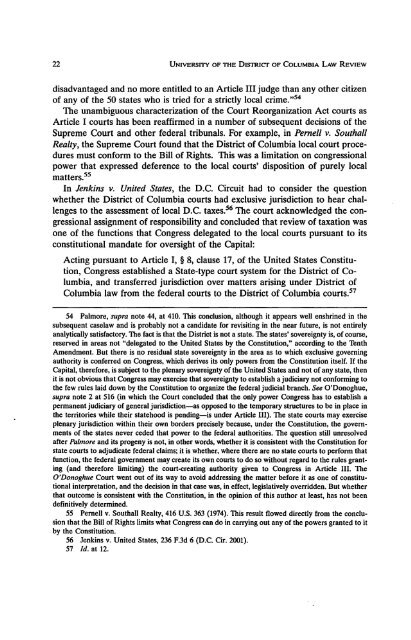Download Electronic Version - UDC Law Review
Download Electronic Version - UDC Law Review
Download Electronic Version - UDC Law Review
Create successful ePaper yourself
Turn your PDF publications into a flip-book with our unique Google optimized e-Paper software.
22 UNIVERSITY OF THE DISTRIcr OF COLUMBIA LAW REVIEW<br />
disadvantaged and no more entitled to an Article III judge than any other citizen<br />
of any of the 50 states who is tried for a strictly local crime. ,,54<br />
The unambiguous characterization of the Court Reorganization Act courts as<br />
Article I courts has been reaffirmed in a number of subsequent decisions of the<br />
Supreme Court and other federal tribunals. For example, in Pernell v. Southall<br />
Realty, the Supreme Court found that the District of Columbia local court procedures<br />
must conform to the Bill of Rights. This was a limitation on congressional<br />
power that expressed deference to the local courts' disposition of purely local<br />
matters. 55<br />
In Jenkins v. United States, the D.C. Circuit had to consider the question<br />
whether the District of Columbia courts had exclusive jurisdiction to hear challenges<br />
to the assessment of local D.C. taxes. 56 The court acknowledged the congressional<br />
assignment of responsibility and concluded that review of taxation was<br />
one of the functions that Congress delegated to the local courts pursuant to its<br />
constitutional mandate for oversight of the Capital:<br />
Acting pursuant to Article I, § 8, clause 17, of the United States Constitution,<br />
Congress established a State-type court system for the District of Columbia,<br />
and transferred jurisdiction over matters arising under District of<br />
Columbia law from the federal courts to the District of Columbia courts. 57<br />
54 Palmore, supra note 44, at 410. This conclusion, although it appears well enshrined in the<br />
subsequent caselaw and is probably not a candidate for revisiting in the near future, is not entirely<br />
analytically satisfactory. The fact is that the District is not a state. The states' sovereignty is, of course,<br />
reserved in areas not "delegated to the United States by the Constitution," according to the Tenth<br />
Amendment. But there is no residual state sovereignty in the area as to which exclusive governing<br />
authority is conferred on Congress, which derives its only powers from the Constitution itself. If the<br />
Capital, therefore, is subject to the plenary sovereignty of the United States and not of any state, then<br />
it is not obvious that Congress may exercise that sovereignty to establish a judiciary not conforming to<br />
the few rules laid down by the Constitution to organize the federal judicial branch. See Q'Donoghue,<br />
supra note 2 at 516 (in which the Court concluded that the only power Congress has to establish a<br />
permanent judiciary of general jurisdiction-as opposed to the temporary structures to be in place in<br />
the territories while their statehood is pending-is under Article III). The state courts may exercise<br />
plenary jurisdiction within their own borders precisely because, under the Constitution, the governments<br />
of the states never ceded that power to the federal authorities. The question still unresolved<br />
after Palmore and its progeny is not, in other words, whether it is consistent with the Constitution for<br />
state courts to adjudicate federal claims; it is whether, where there are no state courts to perform that<br />
function, the federal government may create its own courts to do so without regard to the rules granting<br />
(and therefore limiting) the court-creating authority given to Congress in Article III. The<br />
O'Donoghue Court went out of its way to avoid addressing the matter before it as one of constitutional<br />
interpretation, and the decision in that case was, in effect, legislatively overridden. But whether<br />
that outcome is consistent with the Constitution, in the opinion of this author at least, has not been<br />
definitively determined.<br />
55 Pernell v. Southall Realty, 416 U.S. 363 (1974). This result flowed directly from the conclusion<br />
that the Bill of Rights limits what Congress can do in carrying out any of the powers granted to it<br />
by the Constitution.<br />
56 Jenkins v. United States, 236 F.3d 6 (D.C. Cir. 2001).<br />
57 Id. at 12.














